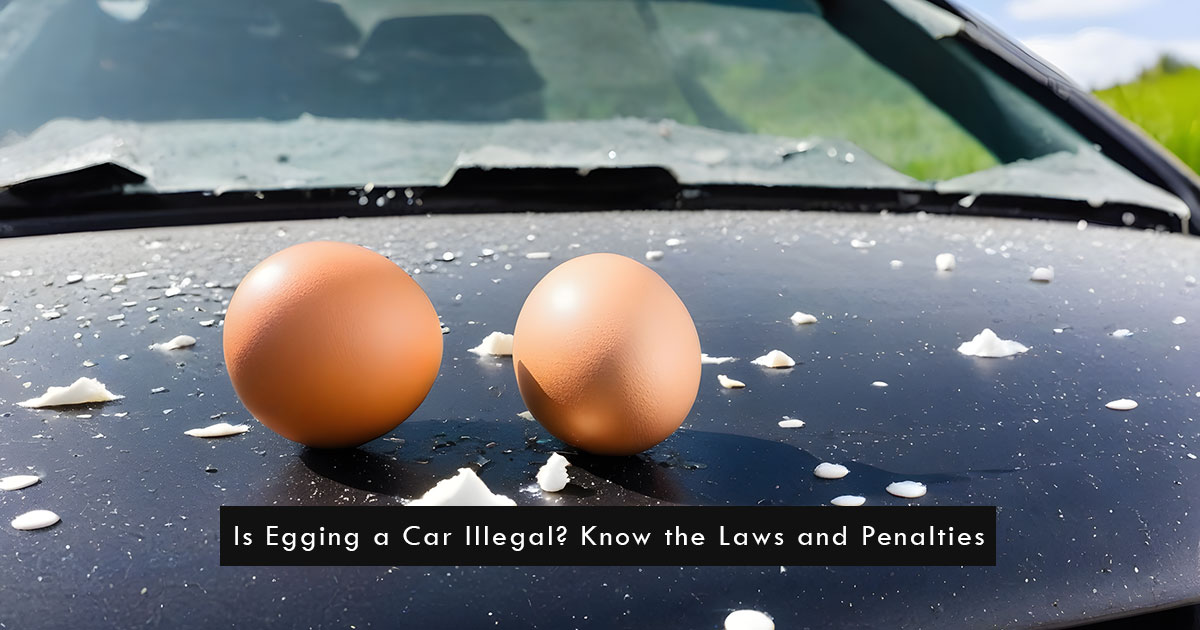Often perceived as a harmless teenage prank, egging a car can actually lead to serious legal consequences. While it might seem like a bit of mischievous fun, this act falls under vandalism and property damage, both of which are punishable offenses. This article delves into the legality of egging someone’s car, the potential consequences, and the steps you should take if you find yourself a victim of this act.
Why is Egging a Car Illegal?
Egging a car is considered illegal because it constitutes vandalism and property damage. When you throw an egg at a vehicle, it can cause long-lasting damage to the paint, leave dents, or even break windows, leading to costly repairs. Additionally, many states have specific laws against vandalism or destruction of property, making egging a car a potential misdemeanor offense.
The Consequences of Egging a Car
If caught egging a car, individuals can face various charges, including vandalism, criminal mischief, or even trespassing if the act occurred on private property. These are serious offenses that can result in fines, community service, and possibly even jail time, depending on the severity of the damage and the state laws involved.
Misdemeanor Charges and Fines
In most cases, egging a car is considered a misdemeanor, punishable by fines and potentially up to one year in jail. The exact penalties vary based on the extent of the damage and the jurisdiction. For example, if the damage exceeds a certain monetary value, typically around $1,000, the misdemeanor could escalate to a felony charge.
Damage Caused by Egging
The physical damage caused by egging can include cracked or broken windows, paint erosion, and dents on the car’s body. These damages are not only expensive to repair but may also significantly diminish the vehicle’s value. In some cases, professional assistance may be required to restore the car to its original condition, leading to further expenses.
Legal Action and Police Involvement
Victims of car egging should report the incident to the police immediately. Law enforcement can investigate the matter, especially if there is evidence of trespassing or if the act was discriminatory or intended to intimidate. Providing any available evidence, such as video recordings or eyewitness accounts, can aid in the investigation.
Trespassing and Other Related Charges
Besides vandalism, egging a car might also involve trespassing charges if the perpetrator was on private property. Other potential charges depend on the situation and can include disorderly conduct and even assault if someone was in the vehicle during the incident.
Restitution and Compensation
Courts may order individuals found guilty of egging a car to pay restitution, covering the cost of repairs or replacement. The amount depends on the extent of the damage and the victim’s loss. Restitution can sometimes be more burdensome than fines or short-term jail sentences, particularly if the damaged vehicle is high-value.
Preventive Measures and Advice
To minimize the risk of car egging, park in well-lit areas or private garages when possible. If your car is egged, clean it as soon as possible to prevent paint damage. In severe cases, you may need professional cleaning or paintwork.
Conclusion
While egging a car may seem like a juvenile prank, it carries significant legal repercussions. It’s important for both potential perpetrators and victims to understand the seriousness of this act. If you’re a victim of car egging, act swiftly to mitigate damage and seek legal recourse.
FAQs
Is egging a car always considered illegal?
Yes, egging a car is illegal as it constitutes vandalism and property damage.
What should I do if my car is egged?
Document the damage, report the incident to the police, and contact your insurance company.
Remember, what might start as a prank can escalate into a criminal offense with lasting consequences. It’s crucial to understand the legal implications of such actions and respond appropriately if you find yourself involved in such an incident.









Leave a Reply